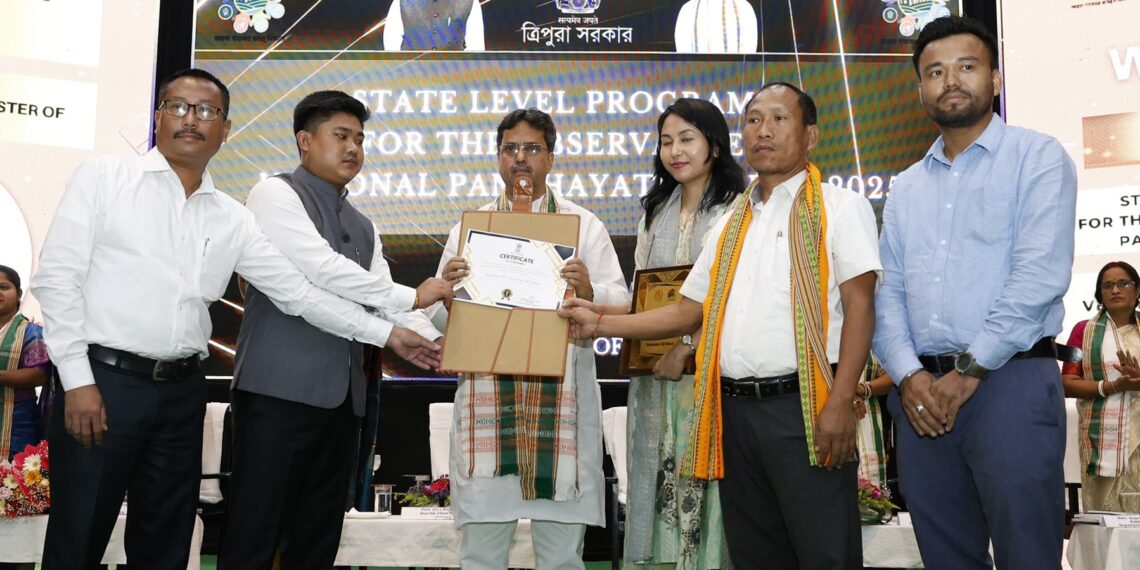Agartala: Tripura has made a significant leap in rural development, securing the 7th rank in the latest Panchayat Devolution Index released by the Central Government.
Chief Minister Dr. Manik Saha praised the state’s Panchayati Raj system during a ceremony held at the Gram Swaraj Bhawan, highlighting its growing effectiveness in empowering grassroots governance.
The event marked the state-level celebration of Panchayati Raj Day, where the Chief Minister underlined the pivotal role of Panchayati Raj institutions in shaping inclusive and community-driven development.
“Panchayats are the foundation of rural democracy and have become crucial in planning and implementing projects in key areas like healthcare, education, clean drinking water, and infrastructure,” he stated.
Dr. Saha also acknowledged the achievements of Gomati District and Ganganagar Block of Dhalai District, which received the Prime Minister’s Award for Excellence in Public Administration for 2024.
Tripura’s local bodies were further recognised with seven National Panchayati Raj Awards this year, a testament to their accountability, transparency, and dedication.
Since 2014, under Prime Minister Narendra Modi’s leadership, rural advancement has been a top national priority. Tripura has aligned closely with this vision by launching initiatives to modernize and digitize its panchayats.
Over the past two years, the state has established 44 new panchayat offices, four District Panchayat Resource Centres, and eight Panchayat Learning Centres.
Efforts are ongoing to bring 15 panchayats and 25 associated institutions up to ISO standards.
Tripura has also introduced digital governance tools, including e-office platforms, online transactions, and UPI integration in every panchayat, significantly enhancing service delivery and transparency.
The ‘Amar Sarkar’ portal, which addresses citizen grievances, has gained national recognition and commendation from the Prime Minister himself.
The Chief Minister’s Model Village initiative continues to promote sustainable and model panchayat development, while the Panchayat Development Index places 3.6% of the state’s local bodies in the top A-category bracket.
To bolster the system further, the state has ramped up training programs for elected representatives and panchayat staff, focusing on capacity building, scientific planning, and sustainable asset management.
In the latest state budget, special allocations were made to support 3,500 Self-Help Groups (SHGs) with a revolving fund and 4,500 SHGs through a Community Investment Fund.
Under the Rashtriya Gram Swaraj Abhiyan (RGSA), Rs. 2 crore has been earmarked to establish a new District Panchayat Resource Centre in West Tripura.
Additionally, plans are underway to set up Panchayat Learning Centres in each of the 27 panchayats and construct 61 more panchayat buildings.
The Panchayati Raj Day celebration was attended by district leaders from all eight districts of Tripura.
Professor Nalini Prabha Tripathi, Director of IIM Shillong, delivered the keynote address, and Abhishek Singh, Secretary of the Rural Development (Panchayat) Department, gave the welcome speech.
A vote of thanks was presented by Prasoon De, Director of the same department.
A highlight of the event was the signing of a Memorandum of Understanding between the Panchayat Department and IIM Shillong to offer specialised training for rural governance enhancement.
The programme also saw the unveiling of the State Panchayat Resource Centre’s smart office, the latest edition of the magazine Gramin Srijan, and the department’s annual report.















